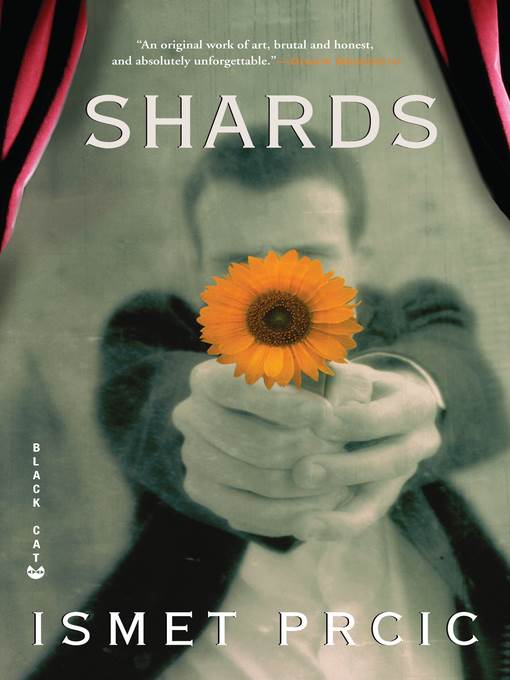
Shards
- اطلاعات
- نقد و بررسی
- دیدگاه کاربران
نقد و بررسی

August 8, 2011
With this frenetic debut novel set during the Bosnian war, Prcic proves that it’s impossible to outrun your past. The narrator, whose name is Ismet Prcic, recounts his childhood in Tuzla before the war and his adolescent interest in theater, which led him to a drama festival in Edinburgh, and his escape to America in 1995. But Prcic’s tale is complicated and nonlinear; intercut with his youthful days in Bosnia spent avoiding Serbian mortar attacks are snippets of his rapidly deteriorating life in California, letters to his depressive mother back home, and, in a most intriguing twist, the story of another young Bosnian man, Mustafa Nalic. Instructed by his American psychiatrist to “write everything” (and take Xanax), Prcic at first seems to have invented Mustafa as a counterpart to his own life: Mustafa the soldier who remained in Bosnia. But as the fictional Prcic continues to deteriorate in the U.S., losing his girlfriend and his fragile grasp on reality, Mustafa morphs from fictional construct to flesh and blood until Prcic cannot separate his memories from what “Mustafa” imagined. Though the intricate structure proves challenging at times, Prcic captures the insanity of war and its unceasing aftermath.

September 15, 2011
A playful but heartfelt debut reflects multiple aspects of the Bosnian War via the perspectives of one Muslim teenager who escapes military service and another who does not.
Not just shards, fragments and brief episodes but a character who may be an alter ego or even non-existent enhance the multi-faceted nature of Bosnia-Herzegovinian-born Prcic's brightly detailed, sometimes hallucinatory story of the shattering impact of age-old enmity and conflict on a civilian population. His central character, also named Ismet Prcic, is observed in two timelines, growing up in Tuzla and as a refugee in the U.S. Diary accounts and notebook passages are interspersed with the story of another character, Mustafa. Although young Ismet finds himself living in a war zone in Bosnia, his life has its conventional dimensions too, like girlfriends and an interest in theatre which gives him his chance to escape the besieged city, to perform at the Edinburgh festival. Mustafa's experience is more shape-shifting. Did he die in the shelling, or witness scenes of appalling brutality while serving in the military, or is he a character in the memoir Ismet is writing to deal with his post-traumatic stress disorder? Depressed, deserted, increasingly unhinged in California, Ismet sinks into despair, his story concluding with the sound of terror and Mustafa's haunting presence.
Too long, but evidence of a spirited, soulful talent.
(COPYRIGHT (2011) KIRKUS REVIEWS/NIELSEN BUSINESS MEDIA, INC. ALL RIGHTS RESERVED.)

May 1, 2011
Safe in California, a young man curiously named Ismet Prcic, who's fled Balkan violence, tries to bridge past and present by writing out memories (real and imagined) of his homeland. His story is soon infiltrated by that of another young man, Mustafa (real? imagined?), who stayed home to fight. Born in Tuzla, Bosnia and Herzegovina, Prcic came here as a young man in 1996; he recently won a National Endowment for the Arts Literature Fellowship in Fiction; his first novel seems bold, imaginative, and wrenchingly germane. Watch this one; with a four-city tour.
Copyright 2011 Library Journal, LLC Used with permission.

Starred review from October 15, 2011
Prcic's electrifying debut tells a harrowing story about the Bosnian War and its heartbreaking consequences from two sides of the Atlantic. Ismet, 18, has left Bosnia and is now struggling with American life in California; Mustafa is a solider who stayed behind to fight. The two young men's interaction with one another is murky, and whether Mustafa's existence is real, imagined, or representational is left to the reader's interpretation. The two volley navet' and wisdom, insight and immaturity across the ocean, seeking their individual paths: one in flight, one in fight but both grabbing at freedom. Ultimately this ambiguity reveals two interpretations of the same experience and serves as a sophisticated critique of war's destructive and divisive nature. Through the contrast of characters, setting, and plotlines, Prcic weaves an incredible tale with a structure reminiscent of Jonathan Safran Foer's fiction, but unique in its candor and rawness. Prcic's novel unveils the still-fresh tragedy of war-torn Bosnia with cunning black humor and stunning realism. Shards is Steven Galloway's The Cellist of Sarajevo (2008) on acid. Utterly consuming, Prcic's story unfolds in full color and remains vivid long after the book is closed.(Reprinted with permission of Booklist, copyright 2011, American Library Association.)




دیدگاه کاربران